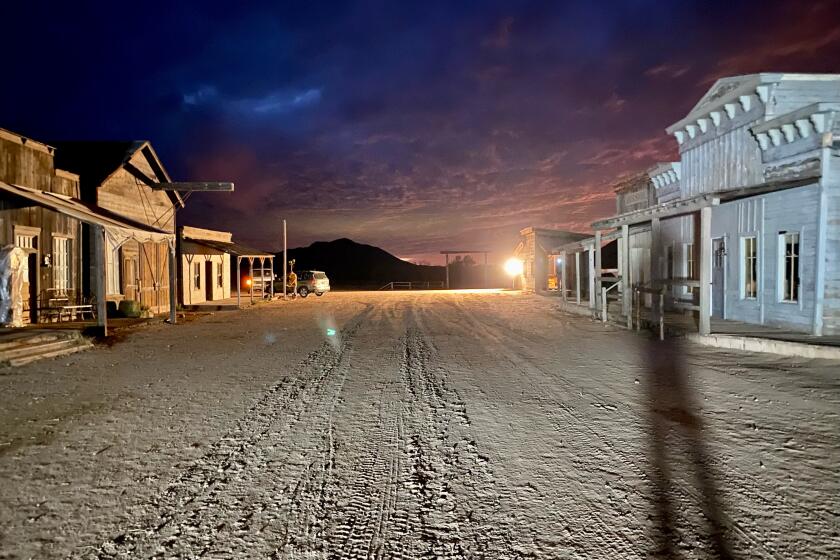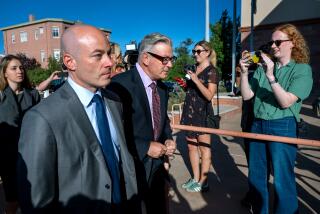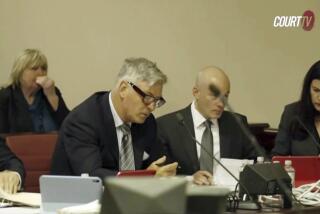Alec Baldwin files arbitration claim against ‘Rust’ producers

Alec Baldwin has filed an arbitration claim against the producers of the movie “Rust” in a bid to shield himself from liability and cover his legal fees after the death of cinematographer Halyna Hutchins on the set of the western last year.
In the arbitration demand filed Friday, Baldwin alleges he was not responsible for the death of Hutchins, whom he shot during rehearsals on a movie ranch outside Santa Fe, N.M.
Seeking indemnification from the “Rust” production company, Baldwin reiterated earlier public statements that he was not in charge of firearm safety or hiring and had been told the gun did not contain any live ammunition, according to the filing with the JAMS private arbitration service reviewed by The Times.
“This is a rare instance when the system broke down, and someone should be held legally culpable for the tragic consequences. That person is not Alec Baldwin,” according to the filing. “October 21 was also the worst day in Alec Baldwin’s life. That day has and will continue to haunt Baldwin.”
A spokesman for the “Rust” producers had no immediate comment. The filing was first reported by the New York Times.
The arbitration demand comes after Baldwin and other producers have been accused of negligence by the Hutchins family and others involved in the production. The lawsuits have cited the hiring of inexperienced crew and a raft of safety violations, including accidental gun discharges prior to the fatal shooting.
Baldwin has been outspoken about his belief that he is not responsible for the death of the 42-year-old rising-star cinematographer, including in an interview on ABC. Her husband, Matthew Hutchins, expressed outrage over Baldwin’s response in an interview last month on NBC’s ‘Today.’
In Baldwin’s filing, the actor details how he tried to support Matthew Hutchins after the tragedy, but the relationship turned sour.
Sharing screenshots of his correspondence with Matthew Hutchins, Baldwin said that the cinematographer’s husband had wanted to confront the crisis together and that he was grateful for the actor’s offers of help and wanted to maintain a relationship with him. Baldwin added he arranged hotel accommodation for the family and spoke at the memorial.
Baldwin further revealed he had convinced the cast to resume filming the movie as part of his plan to reach a financial settlement with the Hutchins family, using film proceeds and an insurance policy payout. But Baldwin said in his filing that efforts to resume filming broke down due to Hutchins’ lawsuit and TV interview.
Hutchins’ attorney Brian Panish called the claim “shameful.”
“Alec Baldwin once again is trying to avoid liability and accountability for his reckless actions before and on Oct. 21 that resulted in the death of Halyna Hutchins,” Panish said in a statement. “Baldwin’s disclosure of personal texts with Matt Hutchins is irrelevant to his demand for arbitration and fails to demonstrate anything other than Hutchins’ dignity in his engagement with Baldwin.”
Aaron Dyer, Los Angeles-based attorney for Baldwin and other producers of “Rust,” has previously said that they continued to cooperate with authorities to determine how live ammunition arrived on the “Rust” set.
How an armorer and a prop master with scant experience wound up in the middle of the Alec Baldwin “Rust” tragedy.
The filing downplayed Baldwin’s role in the movie, specifying that in small-budget films such as “Rust” he does not have the authority to choose crew or direct noncreative aspects of the production, such as hiring.
Baldwin said he requested gun training by the armorer before filming started.
The day after he arrived on set last October, he received 90 minutes of training from the armorer, Hannah Gutierrez Reed. Gutierrez Reed also had offered “cross-draw” training, which the actor said in his filing Friday was not focused on gun safety but the motion of pulling the gun from the holster. He said he did not need this training.
The claim contradicts an assertion in the wrongful-death lawsuit filed last month by the Hutchins family that the actor refused training in the “cross-draw” maneuver that he was practicing that day — just four feet from Hutchins and other crew members.
The Hutchins suit further alleged that Baldwin and other producers of the low-budget film sacrificed crew members’ safety by hiring inexperienced crew and disregarding safety concerns expressed earlier by camera crew operators. Baldwin in his arbitration claim said he wasn’t made aware of safety issues.
He reiterated that at the time of the fatal scene, he was handed the gun by assistant director Dave Halls, and that Halls had said the gun was “cold,” which Baldwin said was a widely accepted term to indicate there was no real or blank ammunition in the gun.
Hutchins directed Baldwin to hold the gun so it was pointed toward her and said that she wanted him to cock the gun, according to the filing. Baldwin said he pulled back the hammer of the gun but not enough to cock the gun, and when he let go, the gun went off.
Baldwin said his total compensation for his appearance and producing “Rust” was $250,000, but he gave back $100,000 as an investment in the movie. He said he was involved in talks about creative matters such as artwork for posters and worked with director Joel Souza on casting. Souza was struck by the same bullet that killed Hutchins but survived his injuries.
In his claim against Rust Movie Productions LLC and producer Ryan Smith, Baldwin said that accidental killers report symptoms associated with post-traumatic stress disorder and that society does not help these individuals.
“Instead, we often pile on to the grief they are experiencing and villainize them as murderers, without putting ourselves in their shoes or considering who is truly culpable for the tragedy.”
Charges have yet to be filed in the ongoing criminal investigation by the Santa Fe County Sheriff’s Office that has focused on the actions of Gutierrez Reed, Halls and Baldwin.
Gutierrez Reed’s attorney, Jason Bowles, said in a statement that Baldwin violated safety protocols by pointing the gun at at Hutchins and did not contact the armorer to inspect the gun before rehearsing the scene.
“Hannah tried her best to be present as armorer, fight for more training with Baldwin, and make guns her ultimate priority on set but faced constant resistance from production and also Baldwin as part of the production team,” the statement said.
Inside the business of entertainment
The Wide Shot brings you news, analysis and insights on everything from streaming wars to production — and what it all means for the future.
You may occasionally receive promotional content from the Los Angeles Times.
More to Read
Inside the business of entertainment
The Wide Shot brings you news, analysis and insights on everything from streaming wars to production — and what it all means for the future.
You may occasionally receive promotional content from the Los Angeles Times.












